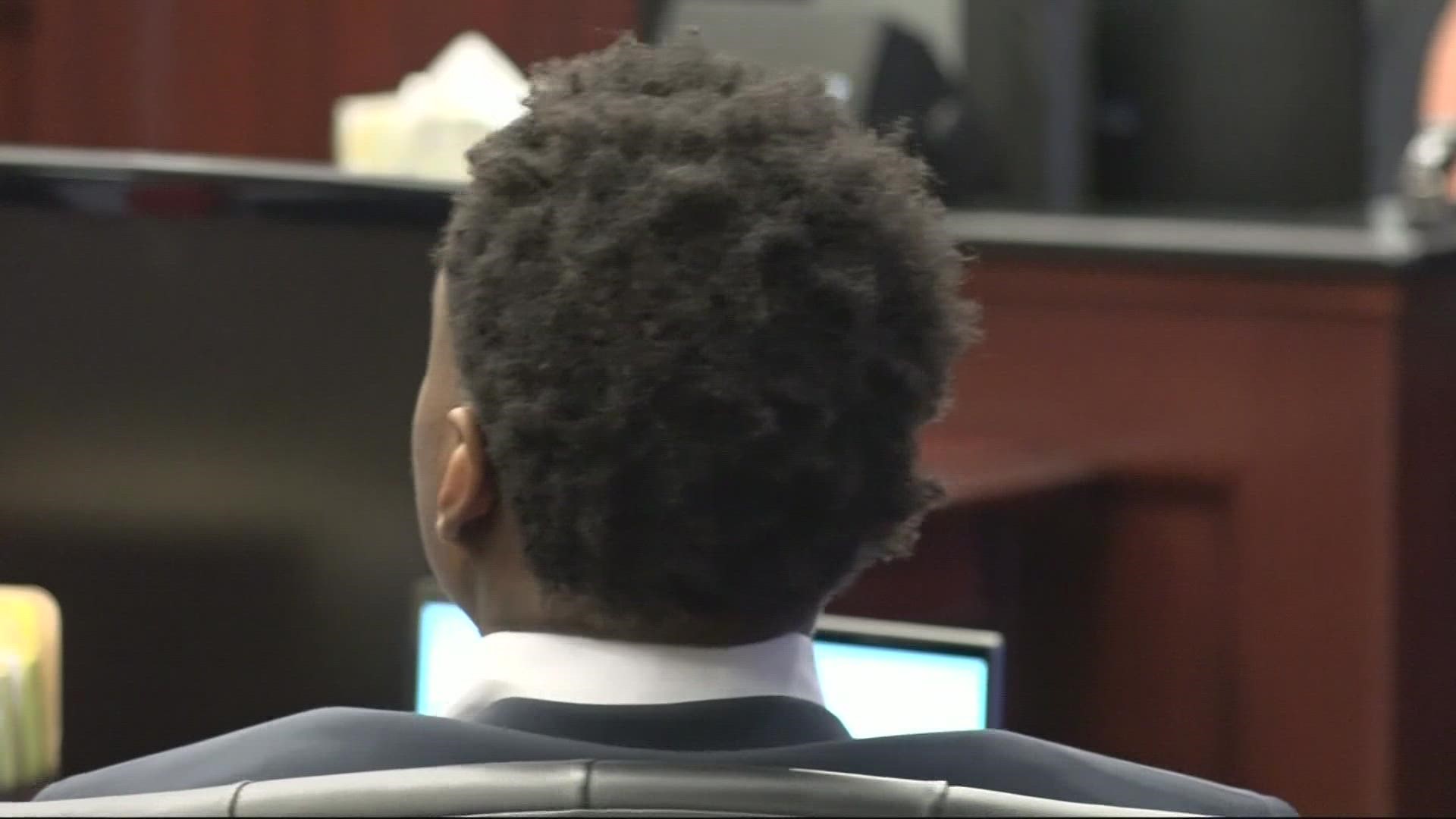JACKSONVILLE, Fla. — Jacksonville rapper Noah Williams, also known as Spinabenz, was back in court Tuesday as opening statements and witness testimony in his trial began. Williams is accused of possession of a firearm by a convicted felon.
Williams, the artist behind the viral 'Who I Smoke' rap video, could face up to 15 years in prison. If convicted on the gun charges, there will be a separate decision to determine if his sentence will be enhanced due to alleged gang ties. That could double his sentence to 30 years.
The first witnesses called to the stand were Jacksonville Sheriff's Office Task Force officers Joseph Ledyard, Phillip Zinz and Justin Peppers. All three were present when the traffic stop was conducted and the gun was retrieved.
In opening statements, Prosecutor Lauren Anderson told the narrative of the night the Glock at the center of the case was discovered.
Both the defense and prosecution agree that the gun was found in Williams' girlfriend Antwoinisha Bryant's car, that she was driving and a traffic stop was conducted because she was speeding. They agree that she consented to have her car searched, which led to the discovery of two firearms, a Glock and 9mm Beretta, in her glove box.
The prosecution showed several body camera videos of the traffic stop. During the video from Peppers’ body worn camera, he asks Williams if he can search him. Williams says, “I don’t want you to, but you’re going to search me anyways.” The officer does not search him, but instead pats him down (meaning he uses an open hand to check that Williams does not have weapons but does not search his jacket or pockets).
While the prosecution said that Williams did not have a willing attitude about being searched, his attorneys said he was exercising his constitutional right to refuse a search.
During the opening statements, Assistant State Attorney Lauren Anderson said that an officer mistakenly believed one of the firearms to be a Smith & Wesson, which it was not. Even though Williams' girlfriend did not in fact have a Smith & Wesson in her car, when she was asked about the gun, Williams told her "You have a Smith & Wesson, too," according to Anderson.
After Williams say this in the video, Peppers can then be heard saying: "You ain't as slick as you think." (He confirmed on the stand these were his words.)
The prosecution suggested Williams said this because he knew Bryant would "own whatever firearms were in that car."
But David Brigney, one of Williams' attorneys, asked Officer Peppers if he believed that knowledge of what guns someone owns was a crime. Peppers said it is not.
The state of Williams' clothing during the traffic stop sparked debate between the defense and prosecution.
Williams’ clothing was mentioned in his arrest report. Peppers wrote that he had his shirt pulled up in one spot, which he believed suggested he may have pulled a gun out of his waistband. Though this was allowed in the police report, Williams’ lawyers argued it was opinion evidence.
Bigney, one of Williams’ attorneys, asked Peppers: “Do you ever have an itch below the waist? Do you ever have to adjust below the waist? Do you ever put your hand below the waist? Or potentially inside your pants? Or move your shirt?”
Peppers said that yes, that may happen. Bigney responded that this meant the testimony that Williams had pulled a gun from his belt is only “one possible circumstance.”
When asked if Peppers had personally ever pulled a gun out from his “appendix” (when someone carries their gun in a waistband or holster) while in a car and then placed in the glovebox, as he suspected Williams of doing, Peppers said no.
Judge Jeb Branham eventually decided that the officer was not qualified to give opinion evidence because he had not personally pulled a gun out in that fashion.
DNA evidence
At the scene, police officers put the guns found in Bryant's car into evidence bags. Peppers confirmed that the Crime Scene Unit was not called to the scene and that officers have sufficient training to confiscate firearms.
There is "no specialized training required to seize a firearm and place it in a bag," Peppers said.
He also said that he is trained to dust for fingerprints but did not do so at the scene. After questioning by Bigney, he said that if Williams had opened the glovebox as suspected, there would be fingerprints there, but no such evidence was gathered.
The gun was processed for DNA later. Williams' lawyers say only 8% of the DNA on the gun belonged to him.
At the end of the day, Bigney brought the testimony to a conclusion when he asked Peppers if he, or any witness, saw Williams with a firearm.
Peppers said no.
Court is back in session tomorrow at 10 a.m. The prosecution plans to have the jury view several of his music videos, including 'My Glock' and another song called 'Drill Time.'

